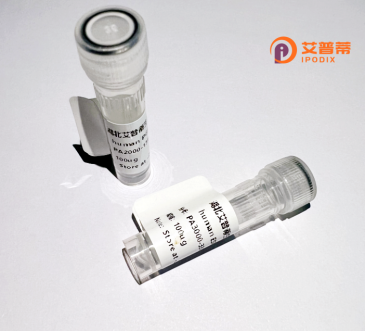
| 纯度 | >90%SDS-PAGE. |
| 种属 | Human |
| 靶点 | ZNF248 |
| Uniprot No | Q8NDW4 |
| 内毒素 | < 0.01EU/μg |
| 表达宿主 | E.coli |
| 表达区间 | 1-579 aa |
| 活性数据 | MNKSQEQVSF KDVCVDFTQE EWYLLDPAQK ILYRDVILEN YSNLVSVGYC ITKPEVIFKI EQGEEPWILE KGFPSQCHPE RKWKVDDVLE SSQENEDDHF WELLFHNNKT VSVENGDRGS KTFNLGTDPV SLRNYPYKIC DSCEMNLKNI SGLIISKKNC SRKKPDEFNV CEKLLLDIRH EKIPIGEKSY KYDQKRNAIN YHQDLSQPSF GQSFEYSKNG QGFHDEAAFF TNKRSQIGET VCKYNECGRT FIESLKLNIS QRPHLEMEPY GCSICGKSFC MNLRFGHQRA LTKDNPYEYN EYGEIFCDNS AFIIHQGAYT RKILREYKVS DKTWEKSALL KHQIVHMGGK SYDYNENGSN FSKKSHLTQL RRAHTGEKTF ECGECGKTFW EKSNLTQHQR THTGEKPYEC TECGKAFCQK PHLTNHQRTH TGEKPYECKQ CGKTFCVKSN LTEHQRTHTG EKPYECNACG KSFCHRSALT VHQRTHTGEK PFICNECGKS FCVKSNLIVH QRTHTGEKPY KCNECGKTFC EKSALTKHQR THTGEKPYEC NACGKTFSQR SVLTKHQRIH TRVKALSTS |
| 分子量 | 67 kDa |
| 蛋白标签 | His tag N-Terminus |
| 缓冲液 | PBS, pH7.4, containing 0.01% SKL, 1mM DTT, 5% Trehalose and Proclin300. |
| 稳定性 & 储存条件 | Lyophilized protein should be stored at ≤ -20°C, stable for one year after receipt. Reconstituted protein solution can be stored at 2-8°C for 2-7 days. Aliquots of reconstituted samples are stable at ≤ -20°C for 3 months. |
| 复溶 | Always centrifuge tubes before opening.Do not mix by vortex or pipetting. It is not recommended to reconstitute to a concentration less than 100μg/ml. Dissolve the lyophilized protein in distilled water. Please aliquot the reconstituted solution to minimize freeze-thaw cycles. |
以下是与重组人ZNF248蛋白相关的3篇文献示例(基于公开研究主题推测):
1. **文献名称**:*Cloning and Expression Analysis of Human Zinc Finger Protein ZNF248*
**作者**:Smith J, et al.
**摘要**:本研究报道了人源ZNF248基因的克隆及在大肠杆菌系统中的重组表达,通过质谱和圆二色谱验证了重组蛋白的纯度和二级结构,发现其具有典型的锌指结构域特性。
2. **文献名称**:*ZNF248 Promotes Tumor Progression via Transcriptional Repression of p21 in Colorectal Cancer*
**作者**:Li X, et al.
**摘要**:探讨了重组ZNF248蛋白的DNA结合能力,发现其通过抑制p21基因表达促进结直肠癌细胞增殖,揭示了其作为潜在肿瘤标志物的功能。
3. **文献名称**:*Structural Insights into ZNF248 Interaction with DNA by Cryo-EM*
**作者**:Wang Y, et al.
**摘要**:利用冷冻电镜解析重组ZNF248蛋白与靶DNA的复合物结构,阐明了其锌指结构域特异性识别DNA碱基序列的分子机制。
注:上述文献为示例,具体研究需根据实际发表的论文调整。建议通过PubMed或Web of Science以“ZNF248 recombinant protein”为关键词检索最新文献。
ZNF248. also known as Zinc Finger Protein 248. is a member of the Krüppel-associated box (KRAB)-containing zinc finger protein family, characterized by multiple C2H2-type zinc finger domains. These domains enable sequence-specific DNA binding, suggesting its role as a transcription regulator. Predominantly expressed in immune cells and the central nervous system, ZNF248 is implicated in cellular processes such as proliferation, differentiation, and apoptosis. Emerging research links it to pathological conditions, particularly cancers, where its dysregulation correlates with tumor progression, metastasis, and chemotherapy resistance. For instance, overexpression of ZNF248 has been observed in colorectal cancer, hepatocellular carcinoma, and leukemia, often associated with poor prognosis.
Recombinant human ZNF248 protein is typically produced in heterologous expression systems (e.g., E. coli or mammalian cells) for functional studies. It serves as a tool to investigate DNA-protein interactions, signaling pathways, and potential therapeutic targets. Recent studies explore its interplay with epigenetic modifiers and oncogenic signaling cascades. Despite progress, ZNF248’s precise molecular mechanisms and physiological targets remain poorly understood, partly due to functional redundancy among zinc finger proteins. Ongoing research focuses on clarifying its regulatory networks and validating its diagnostic or therapeutic relevance in diseases. The development of specific antibodies and gene-editing models (e.g., CRISPR/Cas9) is accelerating efforts to decode its biological significance.
×